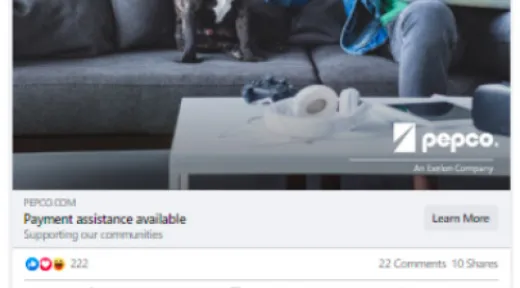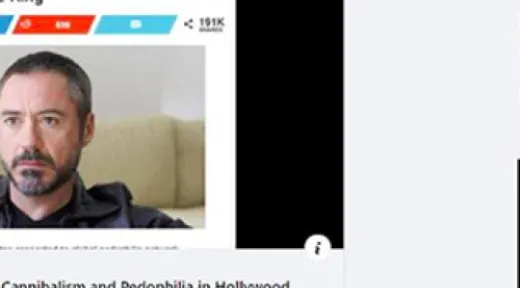
Ad from the auto insurance company Geico appears alongside an antisemitic post from a Soros-focused group
Ad from the auto insurance company Geico appears alongside an antisemitic post from a Soros-focused group
June 22, 2020
Facebook has been claiming that it is effectively addressing hate on its platforms. ADL and others, however, have continued to expose egregious examples of online hate, misinformation and extremism across the company’s products, particularly on Facebook and Instagram. Whether or not these posts technically violate Facebook’s complicated guidelines around hate speech, as a result of the platform’s casual placement of ads, paid advertisements run a risk of being placed next to divisive (and sometimes blatantly hateful) content. Indeed, even a cursory investigation conducted by ADL’s analysts immediately surfaced examples of prominent brands’ advertising displayed on newsfeeds next to hateful and conspiratorial content. Although we have not spoken to these companies, we can assume that their intentions when buying advertising on Facebook did not include being displayed alongside such content.
Both large national brands and small regional brands appear alongside content that ADL and many others would deem hateful or extremist. For example, Airbnb’s and Pepco’s ads appear next to posts from a Facebook group of the Three Percenters. The Three Percenters are a wing of the anti-government militia movement. The Facebook group of the Three Percenters has 8,000 members and consistently writes content that ADL would deem in violation of Facebook’s polcies around dangerous organizations. The below ad for Airbnb appears next to a hateful, anti-Muslim image from that same Facebook group that draws on the recent decision by Quaker Oats to retire the name Aunt Jemima.

The below advertisement for the power company Pepco appears next to content from members of the same Three Percenters group discussing how to foster more divisiveness and violence during the George Floyd protests.

We have also observed paid ads next to posts from a QAnon supporters Facebook group. For example, an ad from the large human resources company Randstad appears alongside a video from Q-Anon Patriots, a Facebook group with over 38,000 members that is spreading misinformation by claiming the media has been promoting cannibalism. The post draws an alleged connection between a sculpture owned by the lobbyist Tony Podesta and the pose in which serial killer Jeffrey Dahmer put one of his victims.

An advertisement for Verizon appears next to a video from the same QAnon supporters page drawing on hateful and antisemitic rhetoric, warning that the Federal Emergency Management Agency (FEMA) is planning to impose martial law and bring on civil war “just like the days of Hitler,” with concentration camps and coffins at the ready and Americans already being quarantined in militarized districts.

Major brands’ advertisements also appear alongside Facebook groups dedicated to conspiracy theories around the financier and philanthropist George Soros. For example, an ad from the auto insurance company Geico appears alongside an antisemitic post from a Soros-focused group of more than 3,000 users, accusing Soros of funding Black civil rights efforts in order to fuel martial law and break down the world order.

Similarly, an advertisement for the fabric freshener Febreze, a brand of Proctor & Gamble, appears next to a link to a conspiracy video that claims that well-known Hollywood stars have exposed rampant cannibalism and pedophilia allegedly connected with other named actors and high profile individuals in Hollywood.

These are just a few examples of major brand ads placed next to misinformation, hateful messages, and extremist content on Facebook. These posts were quickly revealed by a brief search conducted by ADL analysts. Until Facebook adequately addresses problematic content on its platform, advertisers run the risk that their paid ads will appear next to hate, misinformation and conspiratorial content.